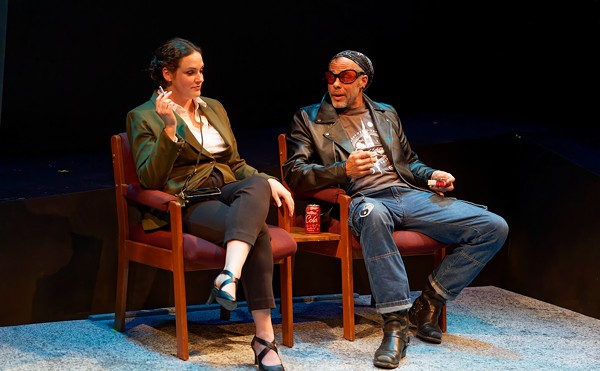La traviata was revolutionary for its time. In 1853 operas were about blue bloods or gods. Verdi's opera is about Alfredo Germont, a middle-class poet, and Violetta Valery, his kept woman. In 1853 operas were not vehicles for social commentary. Verdi's opera attacks the hypocrisy of conventional morality and has a "fallen woman" as its most honest and heroic character.
Mindful that he was going against convention, Verdi worked with his long-time librettist, Francesco Maria Piave, to meld romantic characters and rich, elegant music into a mixture so powerful and enticing it would overcome the bourgeois moral objections he knew would arise. The mixture has stood up for more than 150 years.
Soprano Ailyn Perez as Violetta and tenor Dimitri Pittas as Alfredo take full advantage of Verdi's melodious and emotional music. Perez, in her Opera Theatre debut, has called Violetta her dream role. She inherited the part when Maria Kanyova, who'd been slated to sing it, got pregnant and begged off, and she takes full advantage of the opportunity. Her warm, buttery voice jumps through elaborate vocal hoops in the first act. Having dispensed with the showoff stuff, she settles into the job of creating a believable character. Perez's acting talent rivals her singing. Violetta is torn: On one hand she wants to be a party girl, free of all social constraints, using men for her physical and financial pleasure. But she falls in love with idealistic Alfredo and ends up supporting him.
As an actor, Pittas is a little stiff, but he's an effortless and natural singer, and his full tone does justice to these beautiful melodies. Verdi loved to combine voices. My favorite moments in his music have one voice pulsing rhythmically under another singer who's soaring above with a long and involved melody. Pittas' vocal control allows him to mesh exquisitely in his duets with Perez and again in scenes with baritone James Westman, who plays Alfredo's father, Giorgio. A smooth and rounded singer, Westman is also the best actor in the show, particularly in the scene in which he shows up at the young lovers' country home and convinces Violetta to abandon his son to save the family's reputation.
Verdi's score calls for lots of interaction between singers, with groups of three, four, five — up to a chorus of a few dozen voices playing off each other. Veteran OTSL stage director James Robinson keeps them all interweaving crisply and harmoniously while George Manahan, conducting OTSL's crew of Saint Louis Symphony Orchestra musicians, supports the singers.
Bruno Schwengl's sets and costumes must cover a lot of ground. To impose some order, he has color-keyed the sets to the mood of each act. The opera opens in Violetta's red velvet salon, the scarlet lair of the scarlet woman, scene of lurid and debauched parties. The country home is bare and cold, cold white — an appropriate backdrop against which to watch as Giorgio browbeats Violetta into abandoning and deceiving her man. In the grim and tubercular final tableau, Alfredo realizes he has wronged Violetta and rushes to her deathbed in a faded blue-gray Paris garret. The lovers are reunited — too late. She dies in his arms, coughing, and singing to the end.





